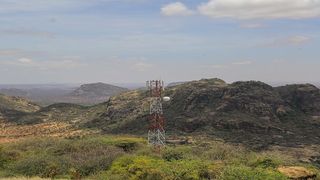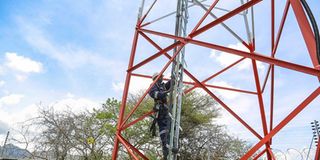
Communication network tames perennial insecurity in Kapedo
What you need to know:
- Telecommunications infrastructure in the ‘Valley of Death’ ensures rapid response during bandit attacks on civilians and police.
- Civilians and police are now able to make distress calls for timely intervention, boosting peace and economic activities.
Located at the border of Baringo and Turkana counties, Kapedo is synonymous to bloody conflicts, which have over the years left a trail of death.
The area has earned the name ‘Valley of Death’ to signify the danger of working or living in the area that has claimed the lives of hundreds of people including security officers deployed in the area to beef up security.
With rugged terrain, deep valleys and temperatures of up to 40 degrees Celsius, the environment is too harsh for habitation or work.
The deep gulleys due to soil erosion have provided the bandits with hideouts from which they been ambush security personnel and civilians.
Calm is slowly returning in the porous area, thanks to Safaricom base stations and communication masts erected in the area to boost communication network and complement the work of security agencies.
According to locals in the area, the Safaricom mast erected at Silale hill in Tiaty sub-county and Napeitom in Turkana East has played a vital role since they can now easily make distress calls to security officers just in case of an attack by armed criminals.
Incessant banditry
Francis Lopalal, a trader at Kapedo shopping centre, claimed that the lack of mobile network in the past had contributed to incessant banditry and livestock theft in the area as the criminals staged attacks and fled in to their hideouts unreported.
“The communication mast at Silale Hill has helped us get access to the 3G network to communicate to the outside world. Being a volatile area, it has also helped us raise the alarm in case armed criminals strike. There was no access to such services in the past and people were killed and livestock stolen by armed bandits who after executing the crimes, flee in to their hideouts unreported,” said Mr Lopalal.
“I am also a businessman in the area. The availability of network has played a key role in transactions such as mobile money services, which we used to travel to Chemolingot trading centre, risking being ambushed by armed criminals.”
At least we can now live like other Kenyans.
In the past, local residents who wanted to communicate used to be rounded up on a police truck and taken to Chesitet where there was a little roaming network, 10km away where they could make calls for some stipulated time. Thereafter, they would be driven back with the presence of armed police officers to protect them from criminals.
“At least we can now live like other Kenyans because we can make transactions, we can make calls and also send important documents through e-mails,” said Mr Lopalal.
Ali Etukan, a resident, also lauded the improved network in the area, which he said has helped opened up the area in terms of security and boost the economic standard.
“We normally get our fresh produce in Marigat town, more than 40kms away, but due to insecurity hiccups in the past and poor communication network, several people, including security officers lost their lives after being ambushed by armed criminals on the way because they were unable to raise the alarm.
“Things are now better because we can make follow-ups to ensure that they reach their destinations safely,” he said.

James Etee, a security officer in charge of Kapedo Rapid Deployment Unit (RDU), says the availability of network in the banditry prone area has eased security operations and patrols.
“We used to have a challenge when carrying out security operations in the hot spot areas because when our officers are deployed to various destinations, they could not communicate to know where they were at that particular moment. This exposed them to attacks by armed criminals,” said Mr Etee.
“The mobile network has also helped us to follow the trends of the criminals over the phone because someone may spot them at a certain place and we can co-ordinate to repulse them easily unlike in the past when you could walk aimlessly in the bush looking for bandits who had their ways of communicating, thus end up killing you instead.”
Information dissemination
The officer noted that communication has also eased response, information coordination and dissemination among security agencies within the area.
Lomelo division assistant county commissioner Jake Jirongo said in the past, it used to be hard governing the insecurity prone region with poor network and roads.
“Livestock theft used to be very rampant because of poor network.
“Pursuing criminals was a mirage because you could not tell where they headed to with the stolen animals,” said Mr Jirongo.
He said the putting up of a safaricom mast in Napeitom, Turkana East, in 2018 has also helped beef up security in the area.
“Armed criminals are tech-savvy and normally take advantage when they know that there is poor communication in an area to allow them execute their crimes unreported.
“The communication masts in this area have paralysed their operations. Though we have isolated cases, locals are now at peace,” said the administrator.
Several attacks have happened in the area in the past including the killing of 19 Administration Police officers in a deadly ambush in Kasarani six years ago.
The slain officers were on a mission to recover a vehicle, which had been set ablaze in another botched security operation.



